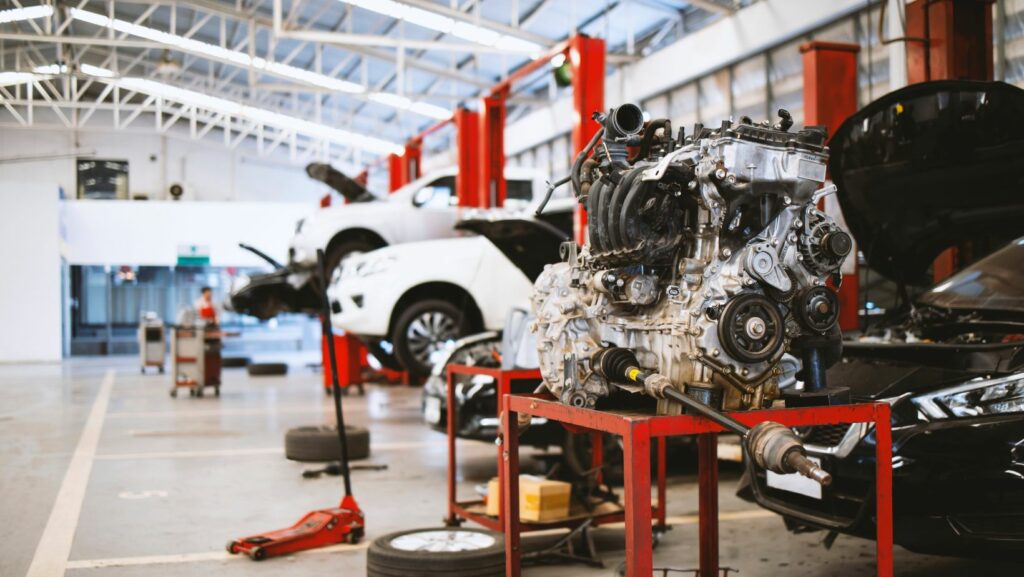Shop Vehicle Care & Maintenance
- Importance of Regular Maintenance: Consistent vehicle maintenance enhances safety, improves fuel efficiency, and preserves resale value, responding to potential mechanical issues early.
- Key Maintenance Tasks: Essential vehicle care components include routine oil changes, tire rotations, brake inspections, fluid checks, and battery maintenance, all of which contribute to optimal performance.
- Choosing the Right Shop: Evaluate shops based on location, certified technicians, service offerings, pricing, warranties, and facility cleanliness to ensure quality care.
- Utilizing Reviews and Recommendations: Reading online reviews and seeking recommendations can guide car owners in selecting reputable vehicle care shops with proven service quality.
- Understanding Service Categories: Vehicle care services are divided into routine maintenance (like oil changes and tire rotations) and specialized repairs (such as engine diagnostics and suspension repairs), helping car owners stay informed on their needs.
- Budgeting for Vehicle Care: Setting aside a budget for routine maintenance and unexpected repairs (between $500 to $1,000 annually) prepares car owners for both planned and unforeseen vehicle expenses.

Proper vehicle care and maintenance is essential for keeping cars running smoothly and efficiently. Regular attention not only enhances performance but also extends the lifespan of the vehicle. For many, navigating the world of auto maintenance can feel overwhelming, but understanding the basics can make a significant difference.
From routine oil changes to tire rotations, knowing what services to prioritize can save time and money in the long run. With the right knowledge and resources, anyone can take charge of their vehicle’s health. This article will explore key aspects of vehicle care and maintenance, providing insights that empower car owners to make informed decisions.
Overview of Vehicle Care & Maintenance
Proper vehicle care and maintenance plays a pivotal role in ensuring optimal performance and longevity. Regular attention to a car’s needs not only boosts efficiency but also fosters financial savings in the long run.
Importance of Regular Maintenance
Regular maintenance is essential for several reasons. It enhances vehicle safety by reducing the chances of accidents caused by mechanical failures. Regular maintenance checks, such as brake inspections or fluid levels, identify potential issues early. It improves fuel efficiency, as a well-maintained vehicle operates more effectively, providing better mileage. Additionally, regular maintenance preserves the vehicle’s resale value, as buyers often favor cars with documented maintenance histories.
Key Components of Vehicle Care
Key components of vehicle care encompass a variety of essential practices.
- Oil Changes: Frequent oil changes remove contaminants and ensure engine lubrication.
- Tire Maintenance: Regular tire rotations and pressure checks extend tire life and enhance handling.
- Brake Inspections: Timely inspections ensure brakes function properly, safeguarding against accidents.
- Fluid Checks: Monitoring fluids like coolant, transmission, and brake fluid prevents overheating and enhances performance.
- Battery Maintenance: Regularly checking battery health prevents failures and ensures reliable starting.
Commitment to these key components ensures that vehicles remain safe, efficient, and reliable.
Choosing the Right Shop for Vehicle Care
Choosing the correct shop for vehicle care enhances maintenance outcomes and contributes to vehicle longevity. Several factors influence the decision-making process, including location, services offered, and reputation.
Factors to Consider
- Location: Proximity to home or work simplifies access for routine maintenance and emergency services.
- Certification: Verify that the shop employs certified technicians with proper training and experience to ensure quality service.
- Services Offered: Check for a comprehensive range of services, such as oil changes, tire rotations, brake repairs, and engine diagnostics, to meet diverse maintenance needs.
- Pricing: Compare pricing structures by obtaining quotes from multiple shops while considering the value of services rendered.
- Warranties: Look for shops that provide warranties on both parts and labor, demonstrating confidence in their work and products.
- Facilities: Assess the cleanliness and organization of the shop. A well-maintained facility often indicates professionalism and care.
Reading Reviews and Testimonials
Reading reviews and testimonials provides valuable insights into a shop’s reputation and service quality.
- Online Platforms: Use platforms like Google Reviews, Yelp, or Facebook to find ratings and feedback from other customers.
- Word of Mouth: Request recommendations from friends, family, and coworkers who have had positive experiences with local shops.
- Problem Resolution: Pay attention to how the shop responds to negative reviews, as this reflects their customer service approach and commitment to satisfaction.
- Consistent Feedback: Look for patterns in reviews. Consistent praise or recurring complaints can guide decisions.
- Expert Opinions: Seek out automotive blogs or forums for expert reviews that can provide an informed perspective on local shops.
Considering these factors and utilizing reviews can help car owners make informed decisions when selecting a shop for vehicle care.
Services Offered in Vehicle Care Shops
Vehicle care shops provide essential services to ensure optimal performance and longevity of vehicles. These services typically fall into two main categories: routine maintenance and specialized repairs.
Routine Maintenance Services
Routine maintenance services form the foundation of vehicle care. Common offerings include:
- Oil Changes: Frequent oil changes enhance engine lubrication, reducing wear and tear. Recommended intervals are usually between 3,000 to 7,500 miles, depending on the vehicle type and oil used.
- Tire Rotations: Regular tire rotations promote even wear, extending the lifespan of tires. This service typically occurs every 5,000 to 7,500 miles.
- Brake Inspections: Comprehensive brake inspections ensure timely identification of wear issues. Technicians evaluate brake pads, rotors, and fluid levels to maintain optimal braking performance.
- Fluid Checks: Checking and topping off vital fluids—such as coolant, brake fluid, and transmission fluid—prevents overheating and mechanical failures. This should be part of routine care, ideally every few months.
- Battery Maintenance: Regular battery checks can identify corrosion and connection issues, helping avoid unexpected failures. Technicians recommend inspections, especially before extreme weather seasons.
Specialized Repairs
Specialized repairs address specific vehicle issues that arise due to wear or damage. Common specialized services include:
- Engine Diagnosis and Repair: Shops utilize diagnostic tools to assess engine performance issues, addressing problems such as misfires or reduced efficiency. Repairs vary based on diagnosis and severity.
- Transmission Services: Comprehensive transmission services include fluid changes and inspections to detect slipping or unusual noises. Timely service enhances longevity and performance.
- Suspension Repairs: Suspension services address issues affecting ride quality, handling, and stability. Common repairs involve shock and strut replacements or wheel alignment adjustments.
- Cooling System Repairs: Addressing leaks or failures in the cooling system prevents overheating. This includes services like radiator repairs and thermostat replacements.
- Electrical System Repairs: Specialized shops diagnose electrical issues, such as faulty wiring or malfunctioning sensors, ensuring all vehicle systems operate correctly.
These offerings equip vehicle care shops to provide comprehensive support, enabling car owners to maintain their vehicles effectively.
Cost of Vehicle Care & Maintenance
Vehicle care and maintenance costs can vary based on several factors, including service types and shop pricing. Proper budgeting ensures car owners can effectively manage these expenses.
Budgeting for Services
 Budgeting for vehicle care involves estimating costs for routine maintenance and unexpected repairs. Maintenance typically includes oil changes ranging from $30 to $100, tire rotations at $20 to $50, and brake inspections costing between $50 and $150.
Budgeting for vehicle care involves estimating costs for routine maintenance and unexpected repairs. Maintenance typically includes oil changes ranging from $30 to $100, tire rotations at $20 to $50, and brake inspections costing between $50 and $150.
Car owners should also allocate funds for seasonal services, such as battery checks and fluid replacements, which can add another $50 to $200 annually. Setting aside a budget of at least $500 to $1,000 per year for vehicle care helps address both planned and unplanned expenses, ensuring financial readiness for necessary services.
Understanding Price Variations
Price variations occur due to factors such as location, shop reputation, and service type. Urban areas generally charge higher rates compared to rural regions, reflecting overhead costs. Independent shops often provide competitive pricing compared to dealerships, which may charge premium rates due to higher operational costs. Moreover, specialized services, like engine diagnostics, can range from $100 to $300, depending on complexity. Understanding these factors aids car owners in making informed decisions about where to seek vehicle maintenance.
Minimizing Unexpected Costs
Prioritizing vehicle care and maintenance is crucial for every car owner. By understanding the essentials of routine services and making informed decisions about where to take their vehicles, they can significantly enhance performance and safety. Regular check-ups not only contribute to a smoother ride but also help in preserving the vehicle’s value over time.
Investing time and resources into proper maintenance is a proactive approach that pays off in the long run. With the right knowledge and a reliable shop, car owners can ensure their vehicles remain dependable and efficient. Taking these steps empowers them to enjoy a safer driving experience while minimizing unexpected costs.

